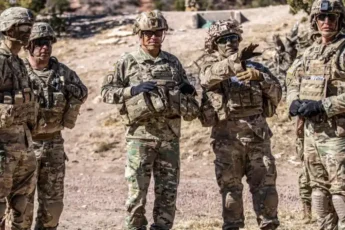Top 10 Essential Benefits Every Veteran Should Know About

Introduction:
Because they have given their lives to serving their country, veterans are eligible for a number of benefits that will assist them in adjusting to civilian life and guaranteeing their well-being. Notwithstanding, exploring the various advantages that are accessible can overpower. In order to be of assistance, we have compiled a list of the top ten essential benefits that every veteran should be aware of.
1. VA Health Care:
The Department of Veterans Affairs (VA) provides comprehensive health care, which is one of the most important benefits available to veterans. Services provided by the VA’s health care system include everything from routine examinations to specialized treatments, mental health care, and emergency services. Veterans might be qualified for nothing or minimal expense care, contingent upon their administration history and pay level. It’s critical for veterans to sign up for the VA medical services framework to get to these advantages and get the consideration they need.
2. Education and Training (GI Bill):
One of the most well-known benefits for veterans is the GI Bill, which provides financial assistance for training and education. Veterans enrolled in colleges, vocational schools, or other training programs are eligible for up to 36 months of education benefits under the Post-9/11 GI Bill. These benefits include book stipends, housing, and tuition assistance. These benefits can also be transferred to dependents of veterans. The GI Bill is a useful tool for advancing your career, whether you want to get a degree, learn a new trade, or improve your skills.
3. VA Disability Compensation:
Disability benefits from the VA are available to veterans with disabilities resulting from their service. The veteran’s disability severity and the extent to which it limits their ability to work and carry out day-to-day activities determine the amount of this monetary tax-free benefit. Veterans can apply for inability remuneration through the VA, and those with huge handicaps may likewise be qualified for extra advantages, like Exceptional Month to month Pay (SMC).
4. VA Home Loans:
Veterans and their families are supported in realizing their dream of homeownership through the VA home loan program. VA home credits offer cutthroat financing costs, don’t need private home loan protection (PMI), and frequently don’t need an initial installment. Veterans can use this benefit to buy or refinance a home, build a new one, or both. Through foreclosure avoidance programs, the VA also provides assistance to veterans who are having trouble making their mortgage payments.
5. VA Pension:
A VA pension may be available to veterans over the age of 65 who are permanently and totally disabled, have limited income, or both. This benefit provides monthly financial assistance to assist with the payment of essential living costs. Aid and Attendance or Housebound benefits, which provide additional financial support, may also be available to disabled veterans who require assistance with daily activities.
6. Life Insurance:
The Veterans Administration (VA) provides veterans with a variety of life insurance options to ensure that their loved ones are financially secure in the event of their death. After leaving the military, veterans can change their Servicemembers’ Group Life Insurance (SGLI) into a renewable term life insurance policy with Veterans’ Group Life Insurance (VGLI). Additionally, the Veterans Administration (VA) offers Service-Disabled Veterans Insurance (S-DVI), which provides life insurance coverage up to $10,000 for veterans with disabilities caused by their service.
7. Vocational Rehabilitation and Employment (VR&E):
The Vocational Rehabilitation and Employment (VR&E) program, which is also known as Chapter 31, aims to help disabled veterans prepare for, find, and keep jobs. The program offers administrations, for example, profession directing, position preparing, continue advancement, and occupation situation help. Additionally, VR&E offers assistance to veterans who want to establish their own businesses or live independently.
8. Burial Benefits:
To pay tribute to veterans who have passed away, the VA provides a variety of burial benefits. A Presidential Memorial Certificate, a government-provided headstone or marker, a burial flag, and burial in a VA national cemetery are among these advantages. The Veterans Administration (VA) may also assist with funeral expenses in some instances. Veterans and their families ought to know about these advantages to guarantee that their administration is respected in a significant manner.
9. Military Discounts and Other Perks:
As a gesture of appreciation for veterans’ service, many businesses provide discounts and other benefits. These discounts can include savings on travel and entertainment as well as reduced prices on retail goods and services. When booking travel, dining out, or shopping, veterans should always inquire about any discounts that might be available. Furthermore, many states offer veterans advantages, for example, charge exceptions, decreased vehicle enlistment expenses, and extraordinary tags.
10. Veteran Readiness and Employment (Chapter 36):
The Veteran Status and Business (Part 36) program offers customized profession advising and backing to veterans progressing to non military personnel life. Veterans can use this program to figure out their strengths, set career goals, and make a plan to get there. Additionally, Chapter 36 provides information on educational and training opportunities to assist veterans in making educated career choices.
Conclusion:
The assistance that veterans can receive as they adjust to civilian life goes beyond these top ten benefits. Veterans must make the most of these advantages to improve their personal satisfaction, seek after new open doors, and guarantee monetary dependability. These essential benefits are intended to honor your service and assist you in succeeding in the subsequent phase of your life, whether you are seeking support for career advancement, education, financial assistance, or health care. To find out more about these benefits and how to use them, veterans should get in touch with the Veterans Administration or a veteran service organization.








Leave a Comment